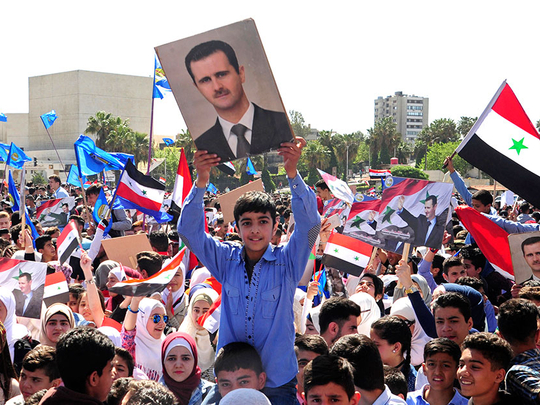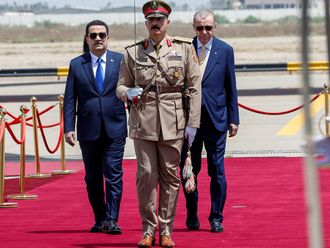
Damascus: European Union foreign ministers threatened on Monday new sanctions on Syria over what the West says were chemical attacks on its own people, but held off from joining expected new US punitive measures against Russia.
After Britain and France joined the United States in missile salvoes meant to knock out Syrian chemical arms facilities, EU foreign ministers eyed steps to deepen the isolation of Syrian President Bashar Al Assad.
“The European Union will continue to consider further restrictive measures against Syria as long as the repression continues,” all 28 foreign ministers said in a statement after their talks in Luxembourg, referring to economic sanctions.
They also endorsed the US, British and French air strikes carried out on Saturday that Western powers said were a response to an April 7 poison gas attack on the rebel enclave of Douma and were seen as a way to stop the use of chemical weapons.
“It is very important to stress (the strikes are) not an attempt to change the tide of the war in Syria or to have a regime change,” British Foreign Secretary Boris Johnson told reporters on arrival at the meeting.
“I’m afraid the Syrian war will go on in its horrible, miserable way. But it was the world saying that we’ve had enough of the use of chemical weapons,” he said.
Any new sanctions on Al Assad would build on a series of such EU measures since 2011, ranging from an arms embargo and a ban on dealings with the Syrian central bank to travel bans and asset freezes on Syrian officials, military, business people and scientists accused of developing chemical weapons.
But EU diplomats said there was no discussion on Monday to target Russian military figures who, along with Iran, have allowed Al Assad to regain rebel-held territory in Syria’s seven-year war and who the West accuse of war crimes arising from aerial bombardments and gas attacks on civilians and hospitals.
The United States is due to announce new economic sanctions on Russia aimed at companies it alleges were dealing with equipment related to chemical weapons, according to US ambassador to the United Nations, Nikki Haley.
However, EU diplomats cautioned that until European governments had more idea of what the United States was planning, it was not possible to quickly follow suit.
In the past, EU measures have sometimes come months after Washington’s.
Meanwhile, international inspectors were prevented from accessing the site of a suspected gas attack which brought US-led missile strikes on Syria and heightened the diplomatic confrontation between the West and Al Assad’s main ally Russia.
The US envoy to the global watchdog said on Monday Russia may have tampered with the site of the incident on April 7 in Douma outside of Damascus.
“It is long overdue that this council condemns the Syrian government for its reign of chemical terror and demands international accountability those responsible for these heinous acts,” US Ambassador Kenneth Ward said in comments seen by Reuters.
In London, British Prime Minister Theresa May was facing criticism over her decision to bypass parliament and take part in the air strikes against Syria.
The United States, France and Britain launched 105 missiles targeting what the Pentagon said were three chemical weapons facilities in Syria in retaliation for the suspected poison gas attack in Douma on April 7.
The Western countries blame Al Assad for the Douma attack, which a Syrian medical relief group said killed dozens of people and which thrust Syria’s seven-year-old conflict into the forefront of global concern once again.
The Syrian government and its Russian ally deny involvement.
Inspectors for the Hague-based OPCW met Syrian Deputy Foreign Minister Faisal Mekdad in the presence of Russian officers and a senior Syrian security official in Damascus for about three hours on Sunday.
The inspectors were due on Monday to attempt to visit Douma, but the British delegation to the OPCW said they had not yet been granted access, citing the agency’s director general.
A senior Russian diplomat said the mission from the international chemical weapons watchdog cannot access the site of an alleged chemical attack near Damascus without an appropriate UN permit.
Russian Deputy Foreign Minister Sergei Ryabkov said the mission wasn’t allowed in because it hadn’t secured the approval of the UN Department for Safety and Security.
His remarks indicate what could be an attempt to bog down the OPCW team.
Both Russia and the Syrian regime have welcomed the OPCW visit.
Douma, which lies in the eastern Goutha district on the outskirts of the capital, was one of the last bastions near Damascus of rebels fighting to topple Al Assad, and the alleged attack took place amid a ferocious government offensive.
In the aftermath, the remnants of the rebel army evacuated, handing Al Assad one of the biggest victories in a war that has killed about half a million people and laid waste to whole cities.
The US-led strikes did nothing to alter the strategic balance or dent Al Assad’s supremacy and the Western allies have said the aim was to prevent the further use of chemical weapons, not to intervene in the civil war or topple Al Assad.
British Foreign Secretary Boris Johnson made this clear on Monday as he arrived at a meeting of EU foreign ministers in Luxembourg, telling reporters: “I’m afraid the Syrian war will go on in its horrible, miserable way. But it was the world saying that we’ve had enough of the use of chemical weapons.”
The US ambassador to the United Nations, Nikki Haley, said on Sunday the United States would announce new economic sanctions aimed at companies dealing with equipment related to Al Assad’s alleged use of chemical weapons.
Responding to Haley’s remarks, Evgeny Serebrennikov, deputy head of a Russian parliamentary defence committee, said Moscow was ready for the penalties.
“They are hard for us, but will do more damage to the USA and Europe,” RIA news agency quoted Serebrennikov as saying.
Although US President Donald Trump had declared: “Mission accomplished” after the strikes, US Lieutenant General Kenneth McKenzie at the Pentagon acknowledged that elements of the program remained and he could not guarantee that Syria would be unable to conduct a chemical attack in the future.
Sayyed Hassan Nasrallah, the leader of the Lebanese Hezbollah movement, which fights alongside the Syrian army, said the US military had kept its strikes limited because it knew a wider attack would spark retaliation from Damascus and its allies and inflame the region.











